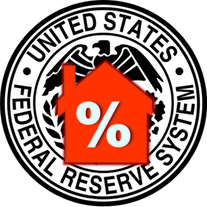You may have heard mortgage rates are going to stay a bit higher for longer than originally…

Thinking About Taking Out a Mortgage? Don’t Obsess Over the Fed
It’s understandable why a person might think that the way to understand where mortgage 
Article from the NY Times:
When people learn that I have spent many years writing about the Federal Reserve, there is almost always one question I get: Are mortgage rates going up or down?
It’s understandable why a person might think that the way to understand where mortgage rates are going — and thus whether to lock in a home loan now, or refinance, or whatever major borrowing decision he or she is facing — is to know what is going on inside the brain of Janet Yellen, the Fed chairwoman, and her colleagues. It’s also … wrong.
For most people, trying to parse the intentions of the Fed should play nearly no role in a decision of when to take out a mortgage or other loan. You should make your borrowing decisions based on current market rates and whether they make a given home purchase or refinancing decision affordable or not. Assume that neither you, nor your mortgage broker, nor your Uncle Ned, who watches a lot of Wall Street sharpies on CNBC, has any predictive capacity to know whether rates will be higher or lower a month from now.
Why would this be? Doesn’t the Fed set interest rates? Well, yes. But there are a lot of complexities that stand between that basic fact and the reality of what it will cost you to take out a home loan.
The Fed indeed sets a target for overnight bank lending rates, and buys and sells securities in order to keep market rates at that level. It has kept that rate near zero since the end of 2008, and is now making noises about raising it later this year, perhaps as soon as September.
That’s all well and good, but there are two things to remember. 1) Mortgages are usually based on long-term interest rates, not short-term interest rates, and 2) The Fed is not on some preordained path; rather, its policy will adjust depending on how the economy evolves.
The first point is crucial. When lenders make you a 30-year fixed-rate mortgage, they are essentially making a bet on the value of money for quite a long time. And in practice, that rate is set not by the whims of the banker at your local strip mall, but by the $21 trillion global bond market.
No matter whom you deal with for the mechanics of your mortgage, in other words, the rate you pay is ultimately set by asset managers, hedge funds, pension funds, sovereign wealth funds and countless other players who are buying and selling securities in hopes of getting the best deal. In effect, if you try to time your mortgage decision based on a hunch about the future direction of rates, you are betting that you have outsmarted the entire global bond market!
There’s no doubt that the Fed’s immediate plans factor into bond prices and hence the interest rate you pay for your mortgage. But it is a safe bet that people at BlackRock and Pimco and the Investment Corporation of Dubai, with hundreds of billions of dollars on the line, have spent a lot more time and brainpower thinking about what the Fed is going to do than you can possibly hope to.
By the time you see people on cable television or in the newspapers debating when the Fed is going to raise rates, it is a safe bet that those probabilities are already priced into the market.
That’s not to say markets are already priced exactly right. If they were, we wouldn’t see the kinds of swings in bond markets we have this year. It’s just that consistently predicting in what direction they are wrong is extraordinarily difficult, so much so that the people who pull it off become billionaires.
In short, I have met many elite fixed-income managers. If you think you have outsmarted them, you are probably wrong.
So how should people make the decision on whether to take out or refinance a mortgage, if not by parsing Ms. Yellen’s speeches? By taking a deep breath, and running the calculations to decide whether they are better off taking action at current prices or not.
That doesn’t mean you’ll necessarily get it right. But sometimes even the most knowledgeable people about Fed policy get it wrong. I know of a guy whose insights into the Fed are better than almost anybody else’s. He refinanced his mortgage on a house in Washington in 2011, getting a 30-year fixed-rate mortgage at 4.25 percent.
He should have waited a year. By late 2012, average rates were almost a full percentage point lower. But by then Ben Bernanke was stuck with his higher mortgage rate, and, presumably, a bit of regret.



